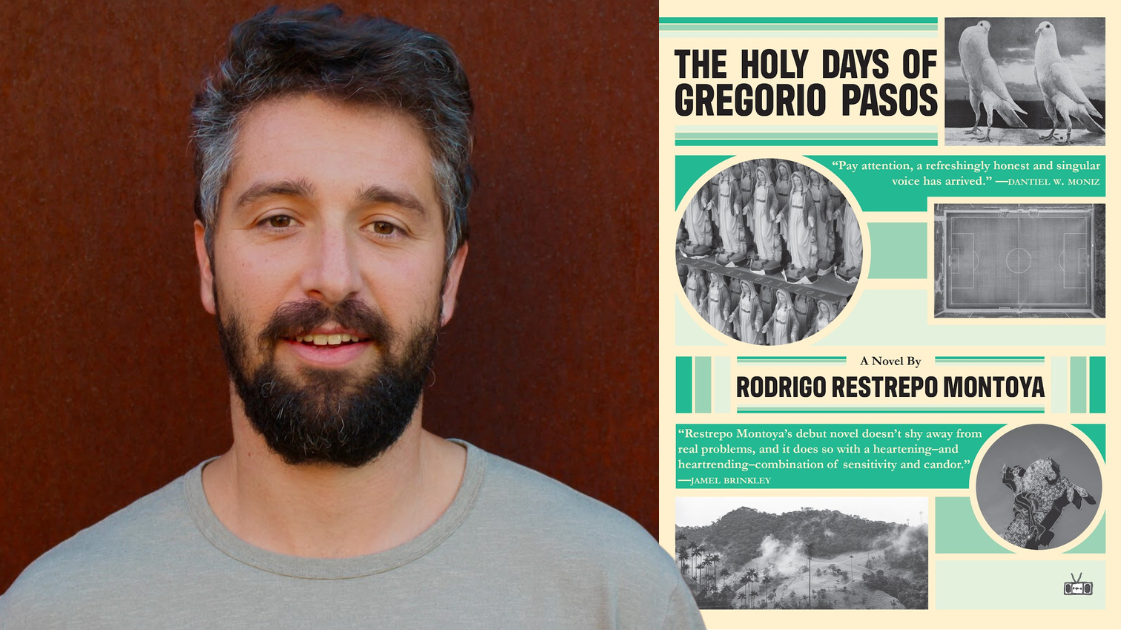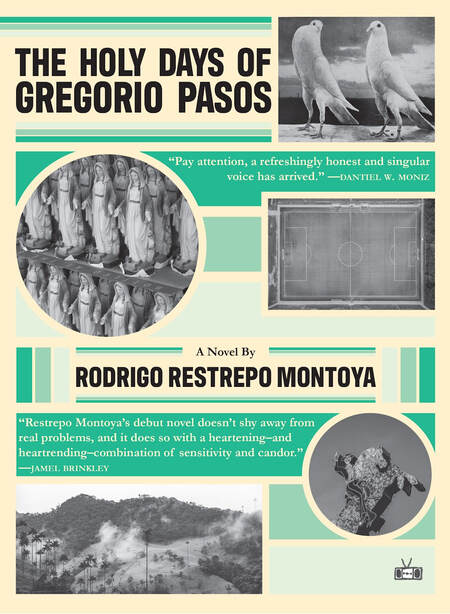A World Filled with Contradictions, Mystery, and Ultimately Beauty:
An Interview with Rodrigo Restrepo Montoya Regarding His Debut Novel, The Holy Days of Gregorio Pasos
By Daniel A. Olivas
One of the great joys of receiving an advanced copy of a debut novel is not knowing what to expect. True, there may be some indicia of the books’ quality. For example, the publisher may have developed a reputation for bringing into the world quality—and perhaps quirky—literature. And the blurbs on the back of the galleys might come from writers I trust. But delving into such a book is nothing short of an adventure, one that may or may not turn out well.
“The Holy Days of Gregorio Pasos” by Rodrigo Restrepo Montoya is published by the small but mighty Two Dollar Radio, an independent press based in Columbus, OH. I’d enjoyed other titles from this self-proclaimed “family-run outfit”—and I was intrigued by the glowing blurbs from the writers Dantiel W. Moniz and Mark Haber who used such words as “singular,” “honest,” “playful,” and “slyly funny” to describe this debut novel. So, hoping for the best, I dug in and started to explore this new voice.
I am happy to report that I was not disappointed. Indeed, I was alternatively exhilarated and giddy with Restrepo Montoya’s gently intelligent, effortlessly humorous story of the novel’s title character as he experiences small moments of self-realization and enlightenment both in the United States and his homeland of Colombia. And as I dug deeper into the novel, I found myself cheering on this sometimes perplexed but always striving protagonist who sometimes plays the role of spectator in a world filled with contradictions, mystery, and ultimately beauty. Simply put, Restrepo Montoya is a talented and mature craftsman who has written a debut novel that delights and edifies the reader through its humor and humanity.
Restrepo Montoya spoke to Latino Book Review about his debut novel’s journey over the course of almost a decade from those first pages he wrote in 2014 to ultimately seeing his book in print this year. The conversation has been edited for length and clarity.
DANIEL A. OLIVAS: Your novel could be called a coming-of-age story, but it does not follow a traditional narrative arc. Rather, Gregorio Pasos’ personal journey is built on almost dreamlike chapters that—taken together—paint a picture of one young man's experiences and enlightenment. Could you talk about your decision to craft your novel in this way, and what were the benefits and difficulties in doing so?
RODRIGO RESTREPO MONTOYA: Most of the foundational decisions I made while writing the novel had to do with clarity. I was compelled—I don’t know exactly why—to approach complex subjects, histories, and characters using simple, rudimentary forms. I wanted the voice to be natural yet restrained, almost quiet. The same went for the structure, which resulted in a steady, chronological narrative.
It’s a short novel, but I like to think that every page is important to the project. Maybe that’s why the chapters have the “dreamlike” quality you’ve mentioned. Throughout the writing process, I often told myself to write a novel as precise as a short story. I focused on each chapter with that in mind, laying them together like bricks in an effort to build something solid and worthwhile.
It’s true that Gregorio gets a little older over the course of the novel, and with that passage of time comes some growth and enlightenment. The same is true for others in the novel. Gregorio’s parents each embark on new versions of their lives following their divorce, with his mother returning to Colombia, her home country. Nico transitions from the late stages of his life into death. Gregorio’s arrival in Georgetown seems to signify a new time in Magdalena’s life as well. I think what might be most interesting about Gregorio’s path is how much he absorbs from the few people in his life. He’s composed of them, in a way. I think this is true of how most peoples’ identities, worldviews, and sensibilities are formed. There was some difficulty in exploring that concept through Gregorio’s character. Ultimately, this required a structure in which Gregorio retraces and remembers a crucial, beautiful, and chaotic year in his life.
OLIVAS: Gregorio's dying uncle, Nico, takes his nephew to Colombia for Nico's last visit to his homeland. Nico's Virgil-like guidance shows both the beautiful and painful sides of a country that has suffered decades of political and economic turmoil. Did you base these chapters on actual visits to Colombia, and did writing these chapters reveal anything new about Colombia that you hadn't realized before?
RESTREPO MONTOYA: I did. Both of my parents were born and raised in Colombia and moved to the United States as adults. Most of my extended family lives there. I’ve spent a lot of time in Colombia—mainly in Medellín and Bogotá. It’s a beautiful country, a place I’ve loved visiting, but it’s true that it’s had more than its fair share of problems.
The chapters you mention are loosely based on actual trips of mine, with visits to museums proving particularly relevant to the book as it was being written. Both the Gold Museum in Bogotá and the Palace of Inquisition in Cartagena had an impact on me when I visited them, but they took on more and more meaning and importance over the years that followed.
I’m not so sure that these chapters revealed anything new to me about Colombia, but writing Nico’s character did give me a way to immerse myself in conversations about the country, its history, and its tragedies. My parents haven’t discussed these things all that often, and yet these subjects still found ways to be silently omnipresent in my mostly North American life.
“The Holy Days of Gregorio Pasos” by Rodrigo Restrepo Montoya is published by the small but mighty Two Dollar Radio, an independent press based in Columbus, OH. I’d enjoyed other titles from this self-proclaimed “family-run outfit”—and I was intrigued by the glowing blurbs from the writers Dantiel W. Moniz and Mark Haber who used such words as “singular,” “honest,” “playful,” and “slyly funny” to describe this debut novel. So, hoping for the best, I dug in and started to explore this new voice.
I am happy to report that I was not disappointed. Indeed, I was alternatively exhilarated and giddy with Restrepo Montoya’s gently intelligent, effortlessly humorous story of the novel’s title character as he experiences small moments of self-realization and enlightenment both in the United States and his homeland of Colombia. And as I dug deeper into the novel, I found myself cheering on this sometimes perplexed but always striving protagonist who sometimes plays the role of spectator in a world filled with contradictions, mystery, and ultimately beauty. Simply put, Restrepo Montoya is a talented and mature craftsman who has written a debut novel that delights and edifies the reader through its humor and humanity.
Restrepo Montoya spoke to Latino Book Review about his debut novel’s journey over the course of almost a decade from those first pages he wrote in 2014 to ultimately seeing his book in print this year. The conversation has been edited for length and clarity.
DANIEL A. OLIVAS: Your novel could be called a coming-of-age story, but it does not follow a traditional narrative arc. Rather, Gregorio Pasos’ personal journey is built on almost dreamlike chapters that—taken together—paint a picture of one young man's experiences and enlightenment. Could you talk about your decision to craft your novel in this way, and what were the benefits and difficulties in doing so?
RODRIGO RESTREPO MONTOYA: Most of the foundational decisions I made while writing the novel had to do with clarity. I was compelled—I don’t know exactly why—to approach complex subjects, histories, and characters using simple, rudimentary forms. I wanted the voice to be natural yet restrained, almost quiet. The same went for the structure, which resulted in a steady, chronological narrative.
It’s a short novel, but I like to think that every page is important to the project. Maybe that’s why the chapters have the “dreamlike” quality you’ve mentioned. Throughout the writing process, I often told myself to write a novel as precise as a short story. I focused on each chapter with that in mind, laying them together like bricks in an effort to build something solid and worthwhile.
It’s true that Gregorio gets a little older over the course of the novel, and with that passage of time comes some growth and enlightenment. The same is true for others in the novel. Gregorio’s parents each embark on new versions of their lives following their divorce, with his mother returning to Colombia, her home country. Nico transitions from the late stages of his life into death. Gregorio’s arrival in Georgetown seems to signify a new time in Magdalena’s life as well. I think what might be most interesting about Gregorio’s path is how much he absorbs from the few people in his life. He’s composed of them, in a way. I think this is true of how most peoples’ identities, worldviews, and sensibilities are formed. There was some difficulty in exploring that concept through Gregorio’s character. Ultimately, this required a structure in which Gregorio retraces and remembers a crucial, beautiful, and chaotic year in his life.
OLIVAS: Gregorio's dying uncle, Nico, takes his nephew to Colombia for Nico's last visit to his homeland. Nico's Virgil-like guidance shows both the beautiful and painful sides of a country that has suffered decades of political and economic turmoil. Did you base these chapters on actual visits to Colombia, and did writing these chapters reveal anything new about Colombia that you hadn't realized before?
RESTREPO MONTOYA: I did. Both of my parents were born and raised in Colombia and moved to the United States as adults. Most of my extended family lives there. I’ve spent a lot of time in Colombia—mainly in Medellín and Bogotá. It’s a beautiful country, a place I’ve loved visiting, but it’s true that it’s had more than its fair share of problems.
The chapters you mention are loosely based on actual trips of mine, with visits to museums proving particularly relevant to the book as it was being written. Both the Gold Museum in Bogotá and the Palace of Inquisition in Cartagena had an impact on me when I visited them, but they took on more and more meaning and importance over the years that followed.
I’m not so sure that these chapters revealed anything new to me about Colombia, but writing Nico’s character did give me a way to immerse myself in conversations about the country, its history, and its tragedies. My parents haven’t discussed these things all that often, and yet these subjects still found ways to be silently omnipresent in my mostly North American life.
|
OLIVAS: In the second part of your novel, Gregorio sets off for a new life in Georgetown where he cobbles together a life with various jobs. He eventually becomes a live-in assistant to an older woman, Magdalena, with whom he develops a relationship which you render subtly and eloquently. What inspired you to create a scenario where Gregorio falls in love with what some might call an unlikely partner? And what did you want to explore in creating this relationship?
RESTREPO MONTOYA: I think the relationship between Magdalena and Gregorio allowed me to explore the ways in which both young and old people experience loneliness in the United States, and how that could be a circumstance through which I could house this unlikely pairing. In the earliest drafts of the novel, however, Magdalena and Gregorio did not develop any kind of romantic relationship. I was more interested in them needing one another for different reasons. Magdalena has an excess of money and living space, almost overwhelmingly so, to the point that she seeks to hire someone to live with her to mitigate her solitude and help with housework. In need of an affordable living situation, Gregorio pursues the opportunity at Magdalena’s house, one that includes free rent and the prospect of some companionship. Over the course of writing and rewriting the novel, the intimacy between Magdalena and Gregorio grew. Eventually they became a couple. It was a natural and happy accident that just made sense for both of the characters, despite their dynamic as landlord and tenant, and despite her being over three times his age. Their relationship is not without its complications, but a real love develops between them regardless. |
When you purchase a book through our site, we earn an affiliate commission and so do independent book stores.
|
OLIVAS: All books have a journey. Could you describe your novel's journey, i.e., when did you start writing it, did you have beta-readers, how did Two Dollar Radio acquire it, etc.?
RESTREPO MONTOYA: I began writing this book back in 2014, without really knowing it. Nico and Gregorio became recurrent characters in stories I imagined would stand-alone. Over time, I realized that the depiction of their relationship would make more sense in the context of a novel. That, and there were other themes and subjects I wanted to explore. From there the novel grew to include other important characters, such as Magdalena, Gregorio’s sister and parents, as well as some others.
As my life went on, the novel did too, eventually growing to include several cities in which I had lived in or spent some time: Danbury, Connecticut; Washington, DC; Tucson, Arizona; and the three Colombian cities I mentioned before. I suppose I was inclined to let the world around me into the novel. Not my life necessarily, but people and places and events and objects that I found interesting. The 2016 US Presidential Election, for example. Or James Hampton’s sculpture The Throne of the Third Heaven of the Nations’ Millennium General Assembly (on display at the Smithsonian American Art Museum) that did sort of change my life and my relationship to art, work, and writing. I wanted to collage all of this material together, and felt determined to pull that off in the form of a simply written and constructed novel.
I was lucky to have plenty of help and support. I had amazing teachers, friends, and family, as well as an amazing partner, all of whom encouraged me to write and finish this project. Their insight was crucial to the book as well, and without their presence in my life this book probably wouldn’t exist at all. A large portion of the novel was completed during my time as an MFA at The University of Wisconsin - Madison. I’m very thankful to the creative writing program there and everyone who was a part of it.
The book was picked up by Two Dollar Radio through their general submissions. I sent the project their way along with a letter detailing my appreciation for their work as a press, and was very happily surprised to get a message back from the editorial director, Eric Obenauf, a few months later expressing interest in publishing my novel. It was one of the great days of my life. It’s been a real pleasure working with Two Dollar Radio at every step of the publication process. The book is better because of their careful, and caring, input. I’ll always be grateful to have had the opportunity to publish my work; especially this project, and especially with them.
RESTREPO MONTOYA: I began writing this book back in 2014, without really knowing it. Nico and Gregorio became recurrent characters in stories I imagined would stand-alone. Over time, I realized that the depiction of their relationship would make more sense in the context of a novel. That, and there were other themes and subjects I wanted to explore. From there the novel grew to include other important characters, such as Magdalena, Gregorio’s sister and parents, as well as some others.
As my life went on, the novel did too, eventually growing to include several cities in which I had lived in or spent some time: Danbury, Connecticut; Washington, DC; Tucson, Arizona; and the three Colombian cities I mentioned before. I suppose I was inclined to let the world around me into the novel. Not my life necessarily, but people and places and events and objects that I found interesting. The 2016 US Presidential Election, for example. Or James Hampton’s sculpture The Throne of the Third Heaven of the Nations’ Millennium General Assembly (on display at the Smithsonian American Art Museum) that did sort of change my life and my relationship to art, work, and writing. I wanted to collage all of this material together, and felt determined to pull that off in the form of a simply written and constructed novel.
I was lucky to have plenty of help and support. I had amazing teachers, friends, and family, as well as an amazing partner, all of whom encouraged me to write and finish this project. Their insight was crucial to the book as well, and without their presence in my life this book probably wouldn’t exist at all. A large portion of the novel was completed during my time as an MFA at The University of Wisconsin - Madison. I’m very thankful to the creative writing program there and everyone who was a part of it.
The book was picked up by Two Dollar Radio through their general submissions. I sent the project their way along with a letter detailing my appreciation for their work as a press, and was very happily surprised to get a message back from the editorial director, Eric Obenauf, a few months later expressing interest in publishing my novel. It was one of the great days of my life. It’s been a real pleasure working with Two Dollar Radio at every step of the publication process. The book is better because of their careful, and caring, input. I’ll always be grateful to have had the opportunity to publish my work; especially this project, and especially with them.
Comment Box is loading comments...
|
|









